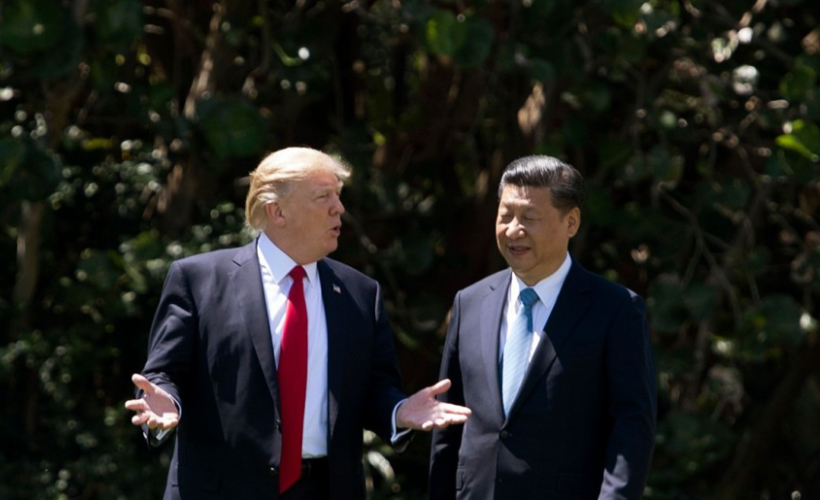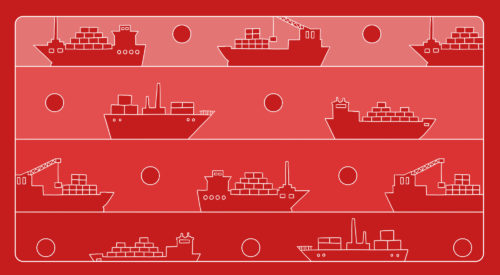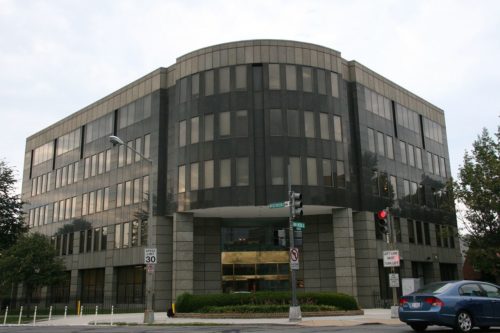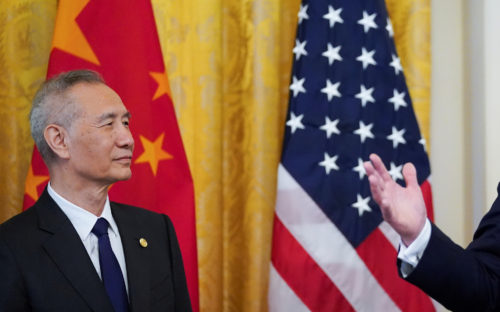Trump: Xi ‘may not be a friend of mine anymore’ — trade war, day 84

Since the first day that President Donald Trump met his Chinese counterpart in April 2017, he has boasted of an unlikely “friendship” between himself and Xi Jinping. Xi, of course, never publicly shared the sentiment.
Now that the trade war has heated up to encompass nearly half of all traded goods between the U.S. and China, and the Trump administration is reportedly rolling out a wide-ranging anti-China strategy that includes accusing China of election interference, Trump is apparently rethinking his warm feelings toward Xi.
- “He may not be a friend of mine anymore,” Trump said of Xi at a press conference (full transcript here) in response to a question about the election interference charge, though Trump brought up the trade war in the same response.
- Trump boasted of his “very, very large brain,” and said that “the leading authority on China” said that “China has total respect for Donald Trump.”
- Trump was referencing Michael Pillsbury, the author of The Hundred-Year Marathon: China’s Secret Strategy to Replace America as the Global Superpower, who appeared on Trump’s favorite TV channel, Fox News, in August to say that Beijing considered Trump to be superior to the past “five or six” American presidents, and that Trump was “so smart” and “playing three-dimensional chess.”
More from the press conference and the implications of recent U.S.-China events:
- Later in the conference, Trump repeated “maybe he’s not anymore” when asked about his friendship with Xi amid the new charges of interfering in American elections.
- China has rejected the charge of election “interference,” though some Chinese analysts quoted in the New York Times (porous paywall) suggested that the China Daily’s ad buy in the Des Moines Register was a bad move because it “left the impression the country is trying to influence the elections.”
- However, “Trump’s ‘meddling’ claim plays into China’s trade narrative,” the Wall Street Journal reports, because by not providing proof along with the claim, Trump has “helped bolster the argument that his real aim [in the trade war] is to stop China’s ascent as a global power.”
- And this claim, on top of the trade war, has “irreparably shattered” the assumptions underlying U.S.-China relations, noted China-watcher Bill Bishop writes.
- At the conference, Trump also sarcastically suggested that he “will, tomorrow, make a call to [Xi]. Say, ‘Hey, how you doing?’ Okay? ‘You don’t mind paying billions of dollars a month in tariffs.’”
- Trump appears to be under the impression that China pays for U.S. tariffs — but actually, American consumers do.
More trade war and U.S.-China news:
- Technology theft complaints
How China systematically pries technology from U.S. companies / WSJ (paywall)
“Interviews with dozens of corporate and government officials on both sides of the Pacific, and a review of regulatory and other documents, reveal how systemic and methodical Beijing’s extraction of technology has become—and how unfair Chinese officials consider the complaints.” - Economic effects of trade war
Exclusive: China’s Nexen plans Gulf of Mexico oil exit amid trade war / Reuters
“Nexen Petroleum, a unit of China’s CNOOC Ltd, plans to exit the United States, divesting its stake in giant oil and gas developments in the Gulf of Mexico as trade tensions between two countries mount, three people familiar with the plan told Reuters on Wednesday.”
Profit growth indicates China’s industry under strain from trade war / Caixin (paywall)
“Industrial profits grew by 9.2% to 519.69 billion yuan ($75.57 billion) last month, with the growth rate down from 16.2% a month earlier, according to data published Thursday (link in Chinese) by the National Bureau of Statistics (NBS).”
The Californian rare earths mine caught between Trump and China / Bloomberg (porous paywall)
“Mountain Pass mine in California…ships semi-processed output for refining in China, which plans a 10 percent tariff on these imports, rising to 25 percent next year.”
“The rare earths trade between the world’s top two economies is largely one-way, with America reliant on China for about 80 percent of its supply.”
China eases up on winter smog fight as it battles American trade war headwinds / SCMP
“China will be less severe with its smog curbs this winter as it grapples with slower economic growth and a trade war with the United States, according to a government plan released on Thursday.” - Commentary
Opinion | As China-U.S. feud enters uncharted territory, Beijing can only blame itself / Washington Post
John Pomfret writes that “no one within the bureaucracy seems willing to inform the red emperor that China’s foreign policy has failed.” Pomfret points to what he sees as missed opportunities in the East and South China Seas and on the Korean Peninsula, and overreach along the Belt and Road. He ends the piece discussing U.S.-China relations: “years of fruitless negotiations over creating a level playing field for American companies in China, ending China’s rampant theft of U.S. commercial secrets and curtailing forced technological transfers have soured many American firms on the myth of the Chinese market.”
Opinion: U.S. will soon find itself at disadvantage in trade war / Caixin
Anatole Kaletsky, the chief economist of Gavekal Dragonomics, dives into some economic models on the macro effects of tariffs, stating that “when an economy is operating at or near its maximum capacity, tariffs will merely raise prices and add to the upward pressure on U.S. interest rates. This clearly applies to the U.S. economy today…unless U.S. businesses are sure the tariffs will continue for many years, they will neither invest nor hire new workers to compete with China.”
Leadership, laughter and tariffs / NYT (porous paywall)
A Paul Krugman column that points out, “A new study from the European Central Bank suggests that even though the U.S. runs trade deficits, a trade war would reduce demand for U.S. goods more than it would reduce demand in the rest of the world. The Bank of England has reached a similar conclusion.” - Chinese rhetoric
China ‘supports millions of American jobs, makes big profits for US firms’, Beijing says / SCMP
“China’s trade and investment with the United States supports millions of American jobs and creates huge profits for its companies, Beijing said this week in a bid to counter Donald Trump’s claims that the country is stealing jobs and eroding the US manufacturing base.” - European business interests
Airbus closes in on $18 billion China deal amid U.S. spat / Bloomberg (paywall)
“China’s escalating trade war with the U.S. has revived prospects of an $18 billion jet order from Airbus SE, with a high-powered delegation from the European planemaker seeking to seal the sale during a visit to Beijing, according to people familiar with the matter.” - Effects on third countries
Japan’s embrace of bilateral trade talks with U.S. spares it from tariffs / NYT (paywall)
Australia fears fallout from US-China trade war / Straits Times - Military relations and the South China Sea
China demands US act to improve military ties amid tensions / Reuters
“China on Thursday criticized the United States for flying B-52 bombers in the vicinity of the South China Sea.” - Monetary policy
World’s two largest economies diverge as China leaves key interest rate unchanged in wake of US Fed cut / SCMP
“China’s central bank left interest rates unchanged on Thursday in response to the US Federal Reserve’s rate increase overnight, underscoring Beijing’s desire to keep borrowing costs low to help stabilize economic growth in the midst of its ongoing trade war with the US, according to analysts.” - U.S. Congress and Tibet
US Congress unanimously passes bill to impose visa ban on Chinese officials who deny Americans access to Tibet / Firstpost
“The ‘Reciprocal Access to Tibet Act,’ which seeks to ensure that Americans are given the same access to Tibet that Chinese citizens have to the United States, was passed by the House of Representatives on Tuesday.”
Previously in The China Project’s trade war coverage:
Trade war, day 83: Trump accuses China of election interference






